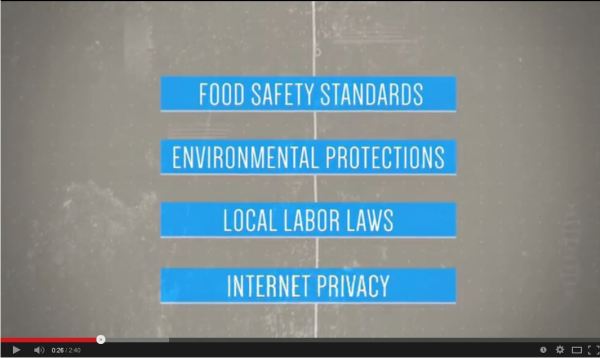We have already discussed in Pressenza the looming disaster being planned under the TTIP (The Transatlantic Trade and Investment Partnership, aka EU-US “Free” Trade Agreement), not only in relation to falling standards of food safety and environmental protection but most importantly on the planned demise of the British Health Service as a free-at-the-point-of-delivery service: The TTIP can seriously damage your Health. The Courts (Investor State Dispute Settlement (ISDS)) being set up to deal with disputes between private companies and governments are indeed a continuation of the toxic bias in favour of private capital shown by early examples.
The TPP (Trans-Pacific Partnership) is identical in its principles.
A new video TPP: The Dirtiest Trade Deal You’ve Never Heard Of gives the basic outline, mentioning also en example of a lawsuit that will become common practice under such Agreements. A petition against it is being run by Sum Of Us.
“Energy company Vattenfall is suing Germany for phasing out nuclear power and replacing it with renewables. In a secret court, the company is demanding a whopping 4.7 billion Euros in compensation.
This lawsuit could have massive repercussions for other European countries turning towards renewables to replace climate-destroying traditional energy supplies. Vattenfall is not the only one lining up to squeeze Germany for making the right decision. Energy giants RWE and Eon are also demanding millions of Euros.
…After the tragedy in Fukushima, Germany started taking a closer look at some of its nuclear power plants to avoid a similar catastrophe. …
Vattenfall is suing Germany for billions in an international arbitration court in Washington. And the game is rigged. These secret investor court hearings are taking place behind closed doors. The tribunals are biased in favour of investors, with corporate lawyers often acting as the judges and parties….”
Other examples include Monsanto vs. small farmers in Guatemala who, normally save seeds from one year to the next, as they have for centuries, but if Monsanto had had its way they would get up to four years in prison for not buying new seeds from the multinational every year. That’s according to the “Monsanto Law” which was recently struck down by Guatemala’s highest court.
Argentina vs Vulture funds is another example of US courts’ bias in favour of private equity and against governments.
A dynamic video: Who Does David Cameron Really Work For? Russell Brand The Trews (E201) by comedian/activist Russell Brand interviewing Guardian columnist George Monbiot further explains the ins and outs of the TTIP discussions being held.
A New Hat Trick from the Banks
The process comes in tandem with a little publicised announcement after the G20 meeting in Brisbane. As a post-crash strategy Banks were asked to increase their assets in such a way that they would not need massive tax-payers bail-outs in the event of another (much announced) crisis. Instead a new strategy has been approved (Cyprus-style) to “bail-in” bank deposits and pension funds, which will be treated as part of the bank’s assets. According to Russell Napier at Zero Hedge
“Rather than reining in the massive and risky derivatives casino, the new rules prioritize the payment of banks’ derivatives obligations to each other, ahead of everyone else. That includes not only depositors, public and private, but the pension funds that are the target market for the latest bail-in play, called “bail-inable” bonds.
“The G20 announcement in Brisbane on November 16th will formalize a “bail in” for large-scale depositors raising the spectre that their deposits are, as many were in 1932, worth less than banknotes. It will be very clear that the value of bank deposits can fall in nominal terms.
“On Sunday in Brisbane the G20 will announce that bank deposits are just part of commercial banks’ capital structure, and also that they are far from the most senior portion of that structure. With deposits then subjected to a decline in nominal value following a bank failure, it is self-evident that a bank deposit is no longer money in the way a banknote is. If a banknote cannot be subjected to a decline in nominal value, we need to ask whether banknotes can act as a superior store of value than bank deposits? If that is the case, will some investors prefer banknotes to bank deposits as a form of savings? Such a change in preference is known as a ‘bank run’.”
It’s “complicated” (no, it isn’t)
Economic violence comes in many forms and colours. From austerity for the less well-off and mounting profits for the rich to children dying of easily treatable diseases for lack of funding, including not only Ebola but also Malaria, TB and many others, we are witnessing a new insidious erosion of the few existing protections to livelihood, health and education by new deals negotiated in secret and in esoteric economese. So, not the type of headlines that will mobilise great social movements and yet people will be deeply and permanently affected by the effects of these Trade deals. No change in government by the electorate will have any power to modify what will be, effectively, set in stone.










